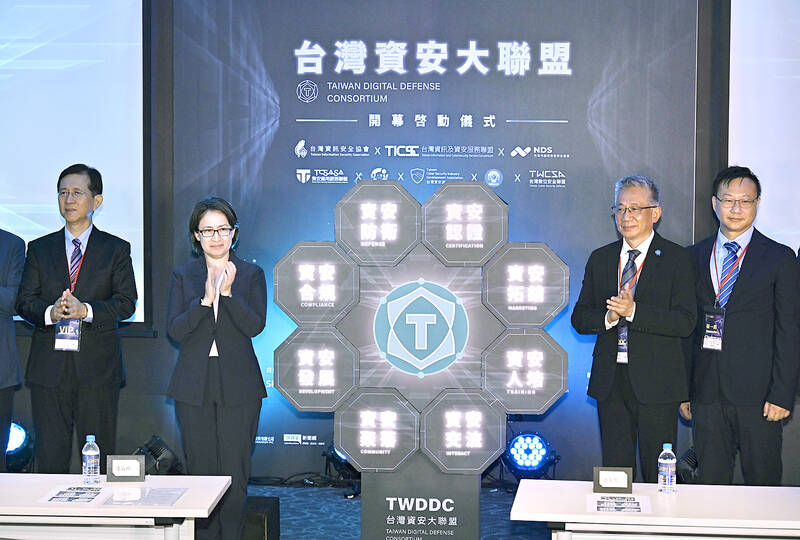The government must make the cybersecurity budget a top priority and avoid compromising national security because of politics, members of the Taiwan Digital Defense Consortium said on Monday.
The consortium was formed last year by eight cybersecurity advocacy groups: the Taiwan Information Security Association, the Taiwan Cyber Security Application Services Alliance, the Taiwan Cyber Security Industry Development Association, the Next Digital Security Cluster, the Taiwan Cyber Security Alliance, the Association of Cybersecurity Talents Cultivation, the Declaration of Hackers and the Taiwan Cyberspace and Cybersecurity Policy Development Association.
The consortium issued a statement ahead of cross-party negotiations yesterday, with Legislative Speaker Han Kuo-yu (韓國瑜) to facilitate discussions over how to resolve a deadlock between the executive and legislative branches caused by a comprehensive budget cut.

Photo: Tu Chien-jung, Taipei Times
“Cybersecurity is not only a line of defense for the corporate world, it is also the pillar that safeguards national security, as well as the nation’s key infrastructure and economy,” the statement said.
“With an increase in cybersecurity threats around the globe, Taiwan needs stable and long-term support from the government to ensure continual development of its cybersecurity industry, and to build a resilient cybersecurity defense system,” it said.
“As such, the budget related to cybersecurity projects must be a top priority, which should not be affected by political factors,” it added. “We hope that legislators could quickly reach a consensus so that budget plans that can help Taiwan can be passed.”
The consortium said that its members visited Vice Premier Cheng Li-chun (鄭麗君), with Democratic Progressive Party Legislator Lin Chu-yin (林楚茵) attending the meeting.
Cheng agreed with the consortium’s vision of turning Taiwan into a global leader in the cybersecurity industry for the “smart era,” the consortium said, adding that she also pledged support to help integrate security resources from the government and industry.
The government needs to bolster cybersecurity policies, as the development of the digital economy also has risks, the consortium cited Lin as saying.
She also promised to help build a more well-rounded cybersecurity environment by proposing bills and funding for cybersecurity programs, it added.
Consortium chairman Tim Tu (涂睿珅) said that it is introducing a Cybersecurity Industry Action Plan 2.0, with the goal of building Taiwan into a research, development and innovation hub of cybersecurity in the Asia-Pacific region.
“Aside from innovation, Taiwan’s cybersecurity industry needs government support and partnerships among industry operators to establish itself as a global leader,” Tu said.

Temperatures in northern Taiwan are forecast to reach as high as 30°C today, as an ongoing northeasterly seasonal wind system weakens, the Central Weather Administration (CWA) said. CWA forecaster Tseng Chao-cheng (曾昭誠) said yesterday that with the seasonal wind system weakening, warmer easterly winds would boost the temperature today. Daytime temperatures in northern Taiwan and Yilan County are expected to range from 28°C to 30°C today, up about 3°C from yesterday, Tseng said. According to the CWA, temperature highs in central and southern Taiwan could stay stable. However, the weather is expected to turn cooler starting tonight as the northeasterly wind system strengthens again

Foreign travelers entering Taiwan on a short layover via Taiwan Taoyuan International Airport are receiving NT$600 gift vouchers from yesterday, the Tourism Administration said, adding that it hopes the incentive would boost tourism consumption at the airport. The program, which allows travelers holding non-Taiwan passports who enter the country during a layover of up to 24 hours to claim a voucher, aims to promote attractions at the airport, the agency said in a statement on Friday. To participate, travelers must sign up on the campaign Web site, the agency said. They can then present their passport and boarding pass for their connecting international

COOLING OFF: Temperatures are expected to fall to lows of about 20°C on Sunday and possibly 18°C to 19°C next week, following a wave of northeasterly winds on Friday The Central Weather Administration (CWA) on Sunday forecast more rain and cooler temperatures for northern Taiwan this week, with the mercury dropping to lows of 18°C, as another wave of northeasterly winds sweeps across the country. The current northeasterly winds would continue to affect Taiwan through today, with precipitation peaking today, bringing increased rainfall to windward areas, CWA forecaster Liu Pei-teng (劉沛滕) said. The weather system would weaken slightly tomorrow before another, stronger wave arrives on Friday, lasting into next week, Liu said. From yesterday to today, northern Taiwan can expect cool, wet weather, with lows of 22°C to 23°C in most areas,

Taiwan sweltered through its hottest October on record, the Central Weather Administration (CWA) said yesterday, the latest in a string of global temperature records. The main island endured its highest average temperature since 1950, CWA forecaster Liu Pei-teng said. Temperatures the world over have soared in recent years as human-induced climate change contributes to ever more erratic weather patterns. Taiwan’s average temperature was 27.381°C as of Thursday, Liu said. Liu said the average could slip 0.1°C by the end of yesterday, but it would still be higher than the previous record of 27.009°C in 2016. "The temperature only started lowering around Oct. 18 or 19